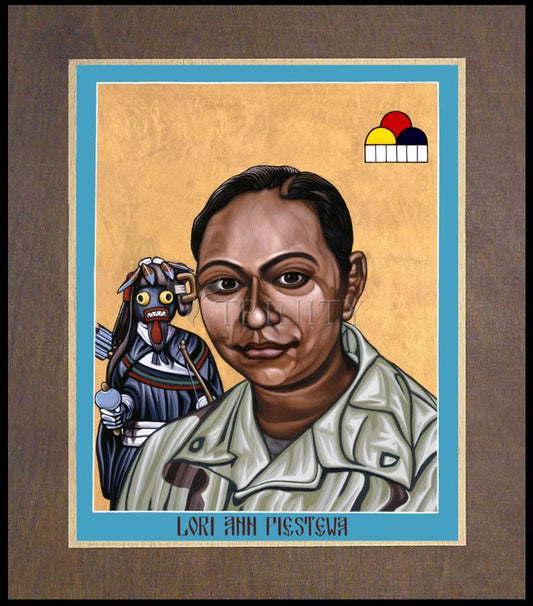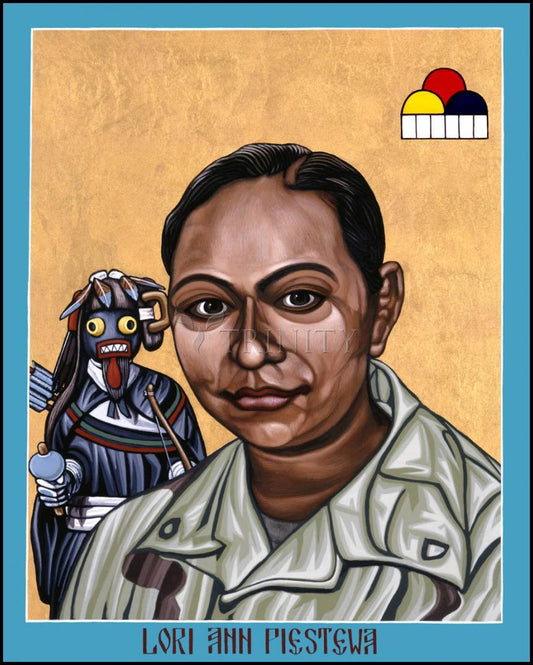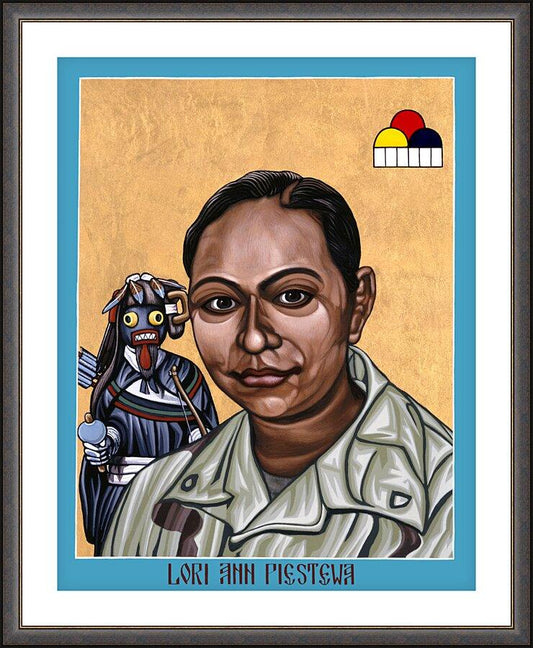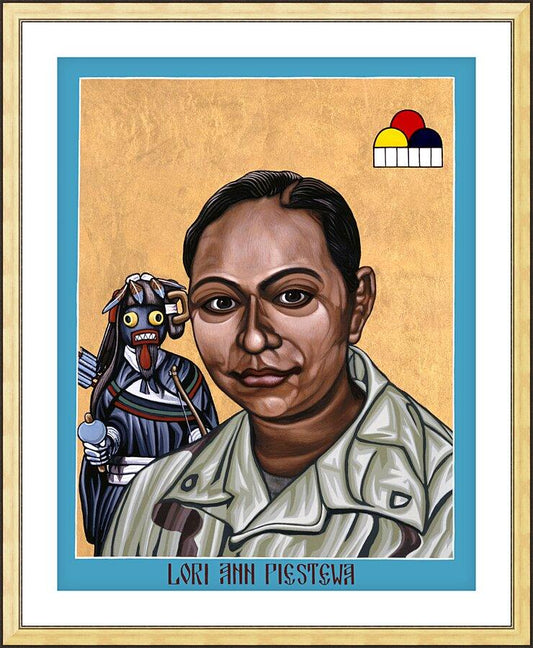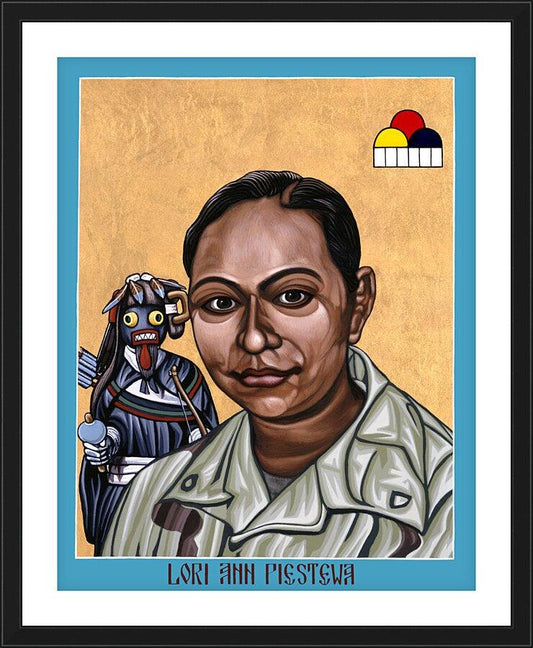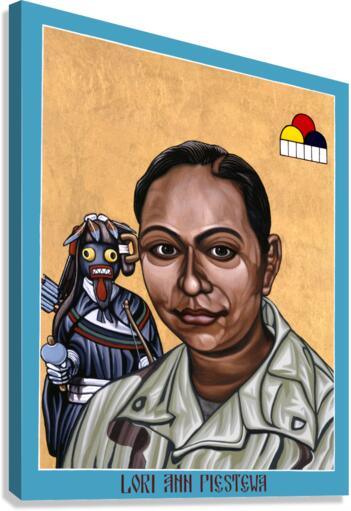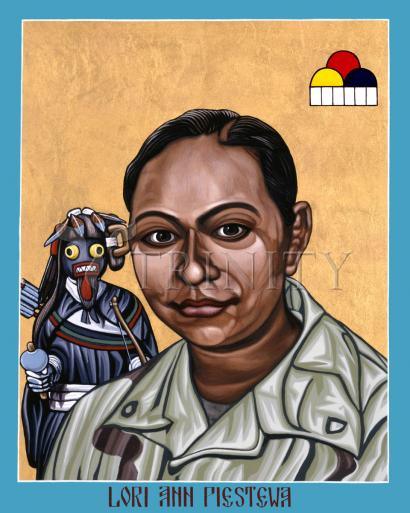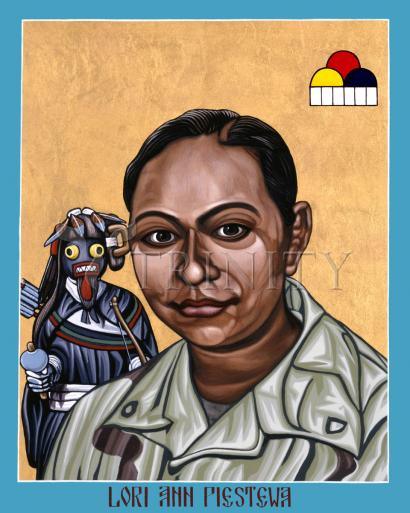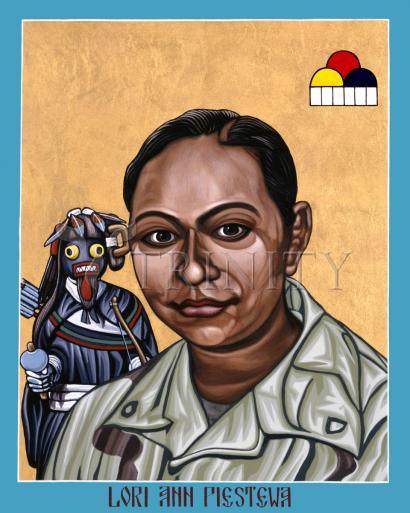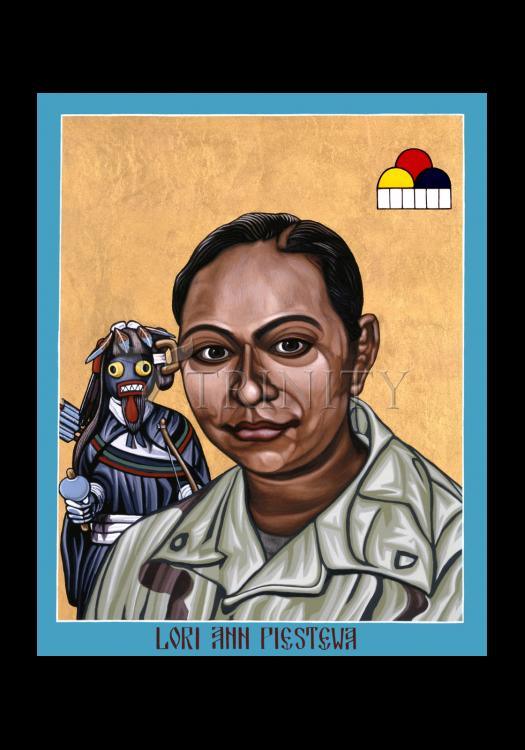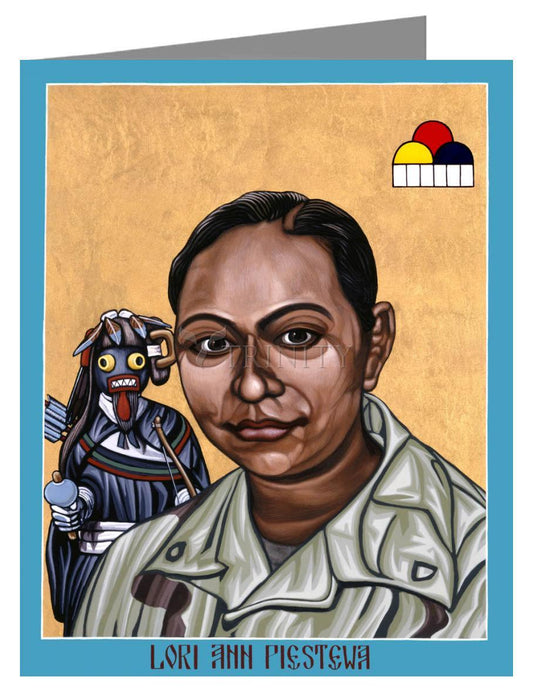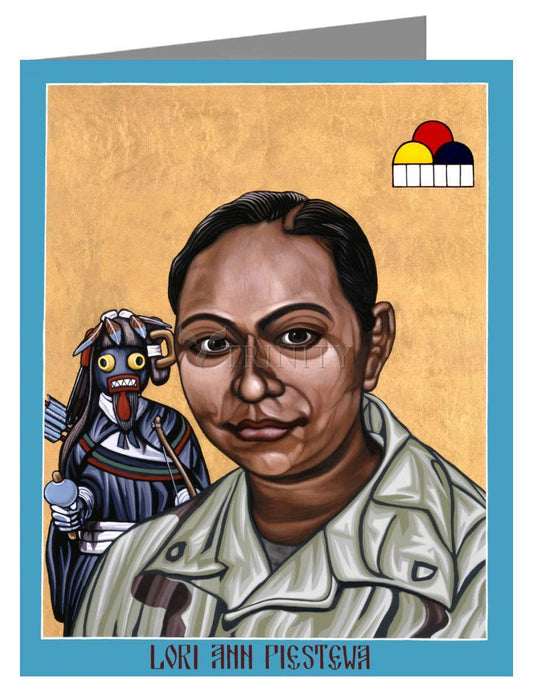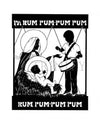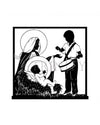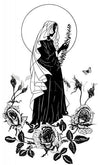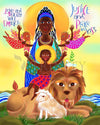ARTIST: Lewis Williams, OFS
ARTWORK NARRATIVE:
First Native American woman to be killed in combat. First woman to be killed in the Iraq War.
Piestewa. The root of her name in Hopi means ‘water pooled in the desert after a hard rain.’ Piestewa are the people who live by this water. This single mom left behind her 4 year-old son, 3 year-old daughter and her family sustained in the desert by her ‘water’; symbolic of her sacrifice, service, love and the snow that gently fell the day they received word confirming her death in Iraq.
Above all she was a mother. A 23-year old Hopi Indian, without options or opportunities, on her beautiful, austere reservation in northern Arizona. Like so many others ‘on the rez’, whose dreams dry up quickly, isolated in the desert winds, the Army was opportunity and a quick fix. Money and benefits enabled her to support the loves of her life. Travel and adventure on the ‘road less traveled’ offered her the chance to dream again. She came from a family of warriors: her father served in Vietnam and her grandfather in WWII.
Her faith, both Catholic and Hopi, sustained her. She enlisted almost two years to the day before her death. The stories are conflicting. On 3/23/03, three days into the Iraq war, her 507th Maintenance Company out of Ft. Bliss, TX, on the push towards Baghdad, stopped to repair a vehicle. They were ambushed. Some were taken POW’s. Her body, and others were discovered in a shallow grave some days later.
In this image, she is accompanied by the kachina He’-e’-e’: the heroine known as the Warrior Woman. One version of the He’-e’-e’ story is that the men of her village were absent. As she was putting her hair up in the traditional whorl, the village was attacked. In a moment, she courageously chose to defend what she loved. Her haste is indicated by her hair: undone on one side and in partial bun on the other. She succeeded defending the village till the men returned. In the upper-right of the picture is a Hopi symbol of cloud and rain, in the traditional belief that if you’ve lived a good life, you will come home as rain.
Read More
Lori Ann Piestewa deserves all the tributes that will come her way. She will always be a young mother to her two children, now three and four years old.
She will always be a Hopi woman who left Tuba City as a soldier and returned home to the mesa as the blessing snow.
In her brief 23 years, she garnered more distinctions than most people do in triple her lifespan.
Army Pfc. Piestewa was the first American servicewoman killed in action in Operation Iraqi Freedom.
She was the first Hopi woman and the first Native American woman to die in combat in the service of the United States.
The war had lasted only four days when her 507th Ordinance Maintenance Company was ambushed on March 23 in southwestern Iraq.
She and other comrades were missing in action for 10 days, until Special Operations commandos uncovered their bodies in shallow graves at Saddam Hussein Hospital in An Nasiriyah as they rescued her roommate, Pfc. Jessica Lynch.
Piestewa will be honored on Memorial Day as rose petals are placed in the reflecting pool of the Women in Military Service for America Memorial at Arlington National Cemetery.
It is a gentle tribute, fitting for a soldier from a tradition of peace. The Hopi are the Hopituh Shinumu, Peaceful People.
It is a fitting way to honor a person whose very name comes from water.
In the Hopi language, the root of Piestewa means water pooled on the desert by a hard rain. Hopis interpret her name as the People Who Live by the Water and as the Ceremonies at the Springs.
It is a good way to remember one who is with the Cloud People, those who bring the blessing rain.
It is a respectful way to acknowledge a person who practiced Hopi ways. The Hopi religion is well known and appreciated in the desert southwest for its Rain Dance, a ceremonial tradition of praying for rain.
It is right to commemorate her as a warrior. She comes from a long line of warriors.
Her father served in Vietnam, her grandfather in World War II.
Hopi code-talkers, like interpreters from many Native nations, distinguished themselves in World War II by sending secret messages in their language and gaining strategic advantages in battle.
In honoring Piestewa, all the code-talkers are honored. A tribute to her is a tribute to the 45 Hopi and 12,000 other Native women and men now in the U.S. armed services.
Honoring Piestewa also honors those warriors of the past, the ones who protected the traditional ways for the Native Americans of today.
One of those warriors was Qotsyawma, a Paa'is (Water) clan ancestor of Piestewa.
Over a century ago, Qotsyawma and other Hopi parents refused to let federal Indian agents take their children to be "civilized" in boarding school, where they would be stripped of their religion, language and family ties. Qotsyawma and 18 other Hopi men were imprisoned on Alcatraz Island for six months in 1895 for the crimes of being "hostiles" and "ringleaders" and "anti-progressive in nature."
Despite the valiant resistance of their families, generations of Hopi children were subjected to corporal punishment and forced to learn different customs, but the result was not the intended one. Most Hopis did not abandon their old ways; rather, they incorporated the new ways into their ancient traditions.
Eventually, almost all of the federal Indian boarding schools were closed and their abusive methods were exposed and discredited.
For Piestewa, this meant that she was not forced to give up her Hopi ways -- she took part in both Hopi and Catholic ceremonies -- and could pursue activities of her choice: she played softball and was the ROTC commander.
The Arizona Republic is advocating another honor for Piestewa. The newspaper takes the editorial position that the mountain in the middle of Phoenix should be named Piestewa Peak.
It is a fitting tribute because Arizona is her home -- near the Grand Canyon and the Painted Desert, in the red rocks country on the Navajo side of the border between the Hopi and Navajo reservations. Native nations own one-fifth of the land in the state. All would be honored through her.
Piestewa Peak would honor all veterans.
Piestewa Peak would honor all women.
Piestewa Peak would end the shameful practice of calling the mountain Squaw Peak.
The name comes from a word in certain Native languages in the northeast U.S. that means a woman's private parts. The word is not vulgar unless it is used to refer to a Native woman or a whole person of any kind. It is not a proper name for a person or a place.
Renaming the mountain for the Hopi mother and hero should be done.
She was a strong woman and deserves a strong symbol. What better monument than a mountain.
If current federal rules need to be tweaked, Sen. John McCain and Rep. J.D. Hayworth are ideally suited to get the job done, as representatives of Arizona and in their positions in Congress on the Senate Committee on Indian Affairs and Native American Caucus.
Piestewa Peak is honorable and elegant.
"Excerpts from Suzan Shown Harjo, Cheyenne and Hodulgee Muscogee, president of the Morning Star Institute in Washington, D.C., and columnist for Indian Country Today.



